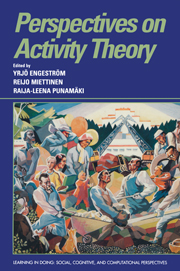Book contents
- Frontmatter
- Contents
- List of contributors
- Series foreword
- Introduction
- Part I Theoretical issues
- 1 Activity theory and individual and social transformation
- 2 The content and unsolved problems of activity theory
- 3 Knowledge as shared procedures
- 4 Activity theory in a new era
- 5 Society versus context in individual development: Does theory make a difference?
- 6 Cultural psychology: Some general principles and a concrete example
- 7 Laws, logics, and human activity
- 8 Collapse, creation, and continuity in Europe: How do people change?
- 9 Activity theory and the concept of integrative levels
- 10 The relevance to psychology of Antonio Gramsci's ideas on activity and common sense
- Part II Language and its acquisition
- Part III Play, learning, and instruction
- Part IV Technology and work
- Part V Therapy and addiction
- Author index
- Subject index
5 - Society versus context in individual development: Does theory make a difference?
Published online by Cambridge University Press: 05 June 2012
- Frontmatter
- Contents
- List of contributors
- Series foreword
- Introduction
- Part I Theoretical issues
- 1 Activity theory and individual and social transformation
- 2 The content and unsolved problems of activity theory
- 3 Knowledge as shared procedures
- 4 Activity theory in a new era
- 5 Society versus context in individual development: Does theory make a difference?
- 6 Cultural psychology: Some general principles and a concrete example
- 7 Laws, logics, and human activity
- 8 Collapse, creation, and continuity in Europe: How do people change?
- 9 Activity theory and the concept of integrative levels
- 10 The relevance to psychology of Antonio Gramsci's ideas on activity and common sense
- Part II Language and its acquisition
- Part III Play, learning, and instruction
- Part IV Technology and work
- Part V Therapy and addiction
- Author index
- Subject index
Summary
Introduction
In studying development of the child psyche, we must … start by analysing the development of the child's activity, as this activity is built up in the concrete conditions of its life.
(Leont'ev, 1981, p. 395)What is meant by the term concrete conditions of life? Activity theory answers in terms of the societal nature of the individual human being. Anglo-American contextualists have recently emphasized the embeddedness of the individual in the sociocultural milieu or ecology (e.g., Lerner, 1979; Jaeger & Rosnow, 1988; Dixon, Lerner, & Hultsch, 1991). Is there a theoretical convergence here, or do significant theoretical and methodological differences remain? This is the question I wish to address here.
Activity theory on the societal nature of the individual
It is fundamental to activity theory that the relation of individuals to every aspect of the world around them is essentially societal. Conceptually, this idea can be traced to the fourth of Marx's Thesen über Feuerbach (1845/1968, pp. 339-341): “In seiner Wirklichkeit ist [das menschliche Wesen] das Ensemble der gesellschaftlichen Verhältnisse.” I cite the original German statement here because the usual English translation (e.g., p. 14) can be confusing with respect to precisely the matter here at issue. The translation of gesellschaftlich as “social” does not fully capture the intended meaning. Animals often behave or are organized by their instinctive natures in such a way that can be called “social,” and this is normally expressed in German by sozial. German usage distinguishes the way in which humans organize themselves socially by the adjective gesellschaftlich.
- Type
- Chapter
- Information
- Perspectives on Activity Theory , pp. 70 - 86Publisher: Cambridge University PressPrint publication year: 1999
- 32
- Cited by

